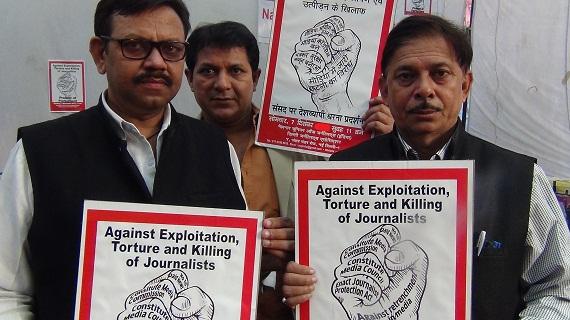HEADLINE
Journalists Covering India’s Maoist Insurgency Facing Harassment and Arrest
"According to the Editors’ guild of India, both state and non-state actors are targeting journalists for reporting the truth. "

Concerns are growing over the frequent harassment, intimidation and arrest of journalists in the Indian state of Chhattisgarh.
According to the Editors’ guild of India, both state and non-state actors are targeting journalists for reporting the truth.
As Bismillah Geelani reports, several reporters and activists have been forced to flee the area in recent weeks.
Malini Subramaniam is a freelance journalist from the southern city of Hyderabad.
She has been covering what she saw as a gap in reportage on the Maoist insurgency, from its hotbed – the central state of Chattisgarh.
But within just a few months on the job, she learned the hard way why there was not much talk about it.
“Ever since I began reporting, from January onwards, threats began to mount on me. I was being questioned by a vigilante group called Samajik Ekta Munch – about whom I have never written. That was later on followed by visits by police asking me where I live, how I work, why do I work and why do I write certain things,” she explains.
But the harassment didn’t stop there.
“This ultimately resulted in throwing stones in my house and getting my landlord to evict me,” she says, “all because of the fact that I was bringing out news that the police did not want me to report about.”
Shalini Gera, a human rights lawyer who was working in the area until recently, has a similar story.
“First there were just anonymous police complaints against us, they were frivolous complaints but the police diligently followed up on them and harassed us,” says Gera, “Then there was this vigilante group that took out press conferences against us and basically carried on a campaign of vilification, called us all kinds of names, conducted rallies against us and burnt our effigies in the market place.”
Chhattisgarh has been one of the strongholds of India’s Maoist movement.
Maoist rebels claim to be fighting for the rights of tribal people and rural poor.
They have a strong support base across the tribal belt and operate in nearly 200 of India’s 600 districts.
The government has launched several military operations to flush them out over the years, but hasn’t achieved much.
Human rights activists like Gera say police have been targeting tribal communities in the name of fighting Maoists, sometimes known as Naxalities.
“We were raising questions that were uncomfortable for the police—about fake encounters, about mass sexual violence,” she says, “And basically anybody who is raising these questions, who is questioning what the police’s strategy in these areas is when it comes to the anti-Naxal operations, is being either silenced by general intimidation or threats, or is being forced out of the area, or being put into jails.”
In recent weeks about half a dozen journalists have been forced to leave the area and at least 4 others have been detained on charges of supporting the Maoists.
To analyst Shivam Vij, there is more to the harsh crackdown than meets the eye.
“It is a deliberate attempt to have a war without a witness to make sure that there are no outsiders looking at what is really happening. It is not just about the Maoists, it is not about who you support, it is about just being allowed to see what is happening in my country,” argues Vij.
Vij says there are also concerns a new government offensive might be in the works – one it would prefer was omitted from the headlines.
But government spokesperson Gopal Krishan Agarwal denies it is cracking down on journalists.
“The Maoists have unleashed terror on such a large scale and if there is fear it is not only for journalists,” he says, “it is for the general public and the security forces as well. Everybody in the state is living with fear.”
Yet Vinod Verma, a member of the Editors’ Guild of India, is not convinced.
Verma headed a team of senior journalists who recently concluded a fact-finding visit to the area.
Journalists in Chattisgarh, he says, are forced to take on of three sides. First, he says are the pro-vigilante and government reporters.
“Then there is not so pro-government journalists, these are people who want to do their job honestly but are not able to do so because of the pressure,” he says, “Then there are those who want to bring out the truth and this has earned them the title of being “pro-Maoist” from the government.”
Despite a government decision to form a committee to investigate the grievances, analysts like Shivam Vij aren’t hopeful anything will change.
“The Maoists say your constitution is not being implemented, your democracy is fake, you don’t really have the freedom of speech that you claim, and you don’t really have the equality that you claim. Now by throwing out human rights activists and journalists you are just proving them right,” says Vij.
The National Human Rights Commission and the Press Council of India have also expressed serious concerns about the threats journalists are facing in Chattisgarh.
- eng
- Bismillah Geelani
- Indian journalist
- Maoist insurgency
Komentar (0)
KBR percaya pembaca situs ini adalah orang-orang yang cerdas dan terpelajar. Karena itu mari kita gunakan kata-kata yang santun di dalam kolom komentar ini. Kalimat yang sopan, menjauhi prasangka SARA (suku, agama, ras dan antargolongan), pasti akan lebih didengar. Yuk, kita praktikkan!